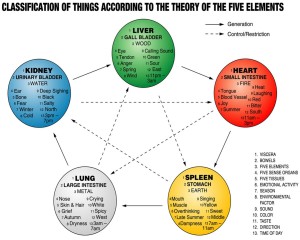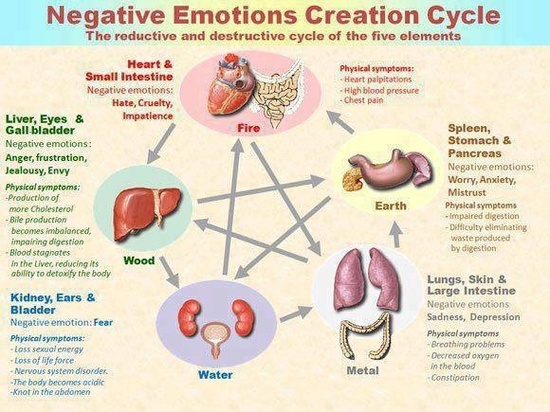06 May Managing Fear through the Kidney System
Written by Dr. M. Ling, 6 May 2013
 Once upon a time there was a man in ancient China who was short in stature, yet very strong, robust and had great courage and a generous heart. It was the Southern Song dynasty (1132-1279 A.D.), a time of many feudal wars. The man’s strength, bravery and youthfulness put him in great demand by the local feudal lord and he fought many battles.
Once upon a time there was a man in ancient China who was short in stature, yet very strong, robust and had great courage and a generous heart. It was the Southern Song dynasty (1132-1279 A.D.), a time of many feudal wars. The man’s strength, bravery and youthfulness put him in great demand by the local feudal lord and he fought many battles.
His infancy, childhood and youth were scarred by battles. He could recount multiple childhood trauma stories of hurriedly putting out the oil lamps, running from invading marauders in the night, and having little to no food to eat for days at a time. He knew many of his neighbours who never escaped in time.
In those days, it was believed to bring great honour for a man to have at least one son. Sons carried on the surname of the father and were valued more because of their perceived strength to work and till the land to grow the family’s crops, and defend the family from unfriendly invasion. Tradition in China was that daughters, on the other hand, left the family upon marriage, rarely to be seen again and hence were considered unreliable in the care of her parents in their old age.
For all these reasons, this man wished to have at least one son. But as fate would have it, he and his wife had 4 healthy daughters. At the birth of each daughter, the man quietly wept with sore desire for a son and pressed his wife to have another child in such hopes. But by the time the fourth daughter was born, the man’s wife had had enough – physically and emotionally. She refused to give birth to any more children in attempts to have a son for her husband’s satisfaction.
So how did this man nurture his 4 beautiful, intelligent daughters? He raised them up in the countryside outside Xi-An city and treated them as if they were 4 sons, teaching them to physically work very hard, be very disciplined, and not be afraid to get dirty, scratched up, sunburned or drop from fatigue and hunger. He taught them traditional kungfu that he learned from Shaolin monks in his youth while seeking refuge during feudal battles. And he showed them how to use all types of small and large tools in order to do carpentry, farming and animal-raising. By the age of 10 years old, all four daughters were strong, confident, could fend off wild animals of all sizes, knew how to yoke the family cow to plow the fields, and repair all the farming tools.
However, as they reached puberty and matured as young women, they each began to respond differently to the pressures of their father to continue being like sons to him.
All the reasons the man wanted a son were rooted in fear – fear that his family lineage would be lost without a son; fear of not being sufficiently protected from invaders without a son for protection; fear of not being cared for in old age without a son to live with him; and fear of not having enough money for basic needs without a son to provide. All his fears resulted from his war-scarred childhood and were a fear of lack – lack of legacy, lack of protection, lack of being cared for, and lack of money.
The man’s deeply subconscious fears negatively impacted his health and pervaded his relationships with all his daughters. This story is about how each daughter managed her father’s fears as she became a young woman.
The eldest daughter obliged all her father’s requests, did as she was told without question and became a people-pleaser. If her father or other people were not happy with her, it disturbed her digestive system giving her a lot of stress and causing her to struggle with chronic fatigue and iron deficiency anemia.
The second daughter was a direct contrast to the first and rebelled to all her father’s demands, sneaking out to have fun with her friends whenever she could. She did nearly everything opposite to what he wanted and this grieved and angered him. His fears could not control her desire for joy and fun.
The third daughter was very logical, decisive and presented her views very strongly and convincingly. She could out-debate their father on most issues, especially on matters of her future. His fears fed her determination to strike her own path for herself in life.
The youngest daughter watched what happened with her older sisters and ended up learning a little bit of each of their strategies. Sometimes she conceded to her father’s demands, other times she clearly rebelled in joyous fun. Yet other times she made very clear decisions about her future path and could not be swayed. And still yet other times, she simply became closed and sadly, quietly walked away. Of all four methods she learned, she increasingly turned inward and simply stopped sharing her passions, opinions and lively, happy personality because of consistently feeling her light put out by her father’s fear-based energy.
How does this all relate to Traditional Chinese Medicine (TCM)?
In TCM, fear corresponds with kidney system and relates to the element of water. In 5 Element Theory, there are 5 main yin organs – heart, spleen, lungs, kidneys, and liver. Each yin organ has its yang-paired organ and corresponds with a different element, emotion, body tissue, sense organ and several other characteristics (click on chart and graphic below to enlarge).
When we look at the response of each daughter to her father’s fearfulness, we can see that each of them demonstrated the energy and emotion of a different organ and element in 5 Element Theory.
For example, the oldest daughter did everything to appease her father, but in doing so, she depleted her own energy stores and worried over what others thought about her care of them all the time. Worry relates to spleen energy and spleen is the governing organ over digestion and the transformation of food into blood. She suffered digestive issues and anemia. Spleen pertains to the element of earth. Earth is used to dam water, but because there is excessive water (i.e. fear), there is insufficient earth to dam the flooding, leading to her deficiency condition (see diagram below).
In the case of the second daughter, the father’s fear could not control her desire for joy and fun. She used joyfulness – the emotion of the heart – to deal with her father’s fear-based controlling strategies. She regularly got canker sores in her mouth, where the tongue is the “sprout of the heart” in Chinese medicine. Typically, water (the element pertaining to kidney and fear) extinguishes fire (the element pertaining to heart and joyfulness). However, the more fear (i.e. water) the father tried, the more this daughter used rebellious fun to prevent her fiery energy from being extinguished.
As for the third daughter, her analytical, logical decisiveness represents strong liver energy. The related element is wood and wood absorbs a lot of water for growth. The more the father expressed his fears (i.e. water) for his third daughter’s future, the more it fed her sturdy, wood-like determination and persistence to walk her chosen path. When this was not respected, she burst out in anger, the emotion of liver energy. Liver system governs tendons, nerves and ligaments. In her later years, she suffered nervous system disorders.
In regards to the youngest daughter, although she learned the previous three methods applied by her older sisters, because she increasingly turned inward and stopped sharing her happy, lively self with others, she demonstrates lung energy. When lung is out of balance, grief, sadness and depression dominate.
The element pertaining to the lung system is metal and metal holds water. But when there is excessive water (i.e. fear energy), it becomes too much water for metal to hold and it overflows metal. In this case, after so many years of facing the father’s fear energy, it became too much for her and she ended up sad and depressed with shortness of breath upon physical exertion and frequent sinus congestion.
The point of this story is not to say that any emotion is better or worse than another. They are merely indicators of one’s state of health. Rather, the point is that when there is one particularly dominating emotion, after an extended period of time it will inevitably be met with another emotion that attempts to balance it in some way. And if any of these emotions – fear/shock, anger, overjoy, worry, or grief are held in the body long-term without being fully felt, acknowledged and allowed to move on, then these emotions will wreak havoc and manifest physical illness within the body.
The human being is designed to fluidly feel all these emotions, but what emotion(s) do you mainly tend towards? Fear/shock, anger, over-excitement, worry or grief? And how do you respond to these different emotions when they arise in you, or come from others?
Traditional Chinese Medicine provides a comprehensive explanation through 5 Element Theory for how all these emotions interact and how they affect the body’s internal organ systems if sustained long-term. This theory can be key in understanding one’s own emotional tendencies and responses to others of similar or varying emotional energies.
Read about Managing Joyfulness Through the Heart System.




